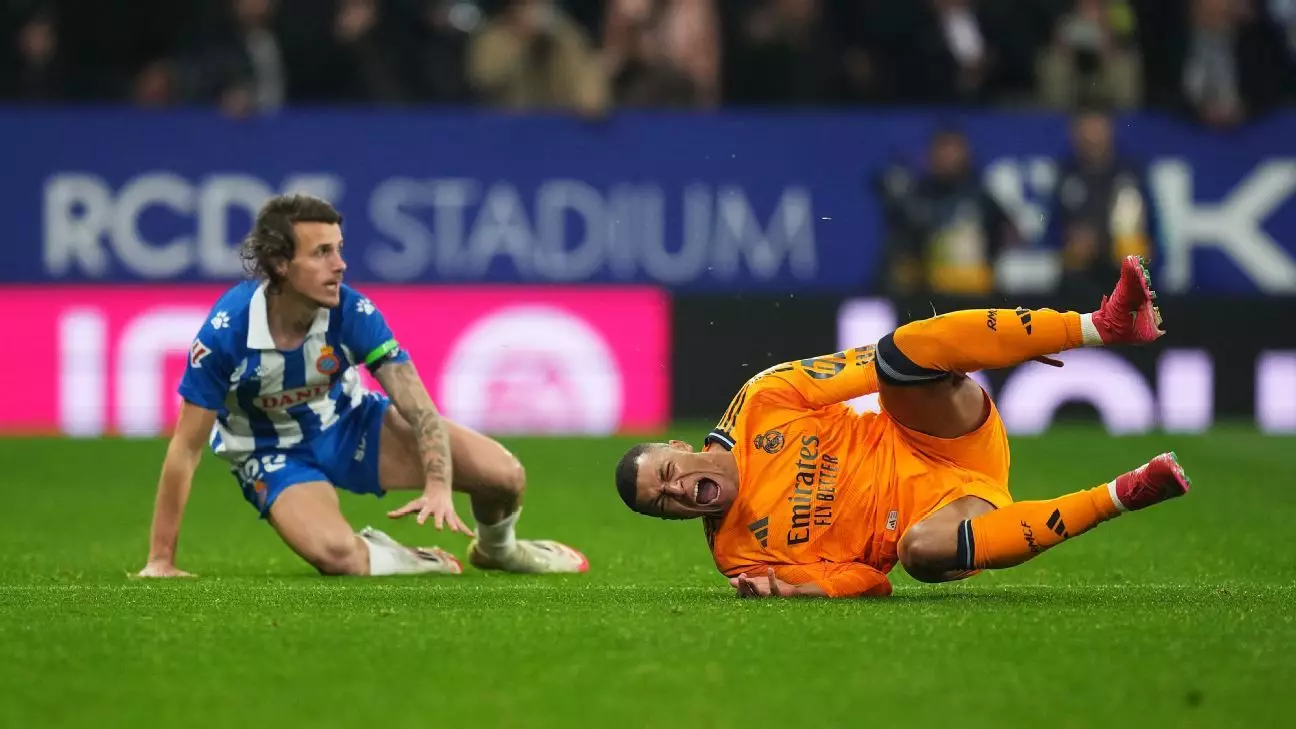In recent weeks, Real Madrid has found itself engulfed in controversy over officiating standards in LaLiga. The frustration reached a boiling point after their narrow defeat to Espanyol, a match marred by pivotal refereeing decisions. Carlo Ancelotti, the club’s head coach, voiced his concerns, emphasizing that the club’s formal complaint to the Spanish Football Federation (RFEF) regarding refereeing is an essential step forward. The board condemned the current refereeing system as wholly discredited, calling for transparency and reform. It is this backdrop of discontent and scrutiny that sheds light on the ongoing challenges facing Real Madrid.
The incident that triggered this uproar was crucial; an unpunished challenge by Espanyol defender Carlos Romero on Kylian Mbappé raised eyebrows not only within the Madrid camp but throughout the footballing community. Romero’s subsequent victory-clinching goal added insult to injury, leaving many to question the integrity of officiating in the league.
Ancelotti’s comments indicate a strong desire for change within the organization. The club’s plea to access recorded conversations between the on-field referee and the VAR officials reflects a demand for accountability. The logic is palpable; the lack of clear explanations on contentious decisions such as Romero’s challenge only deepens suspicions of refereeing anomalies. Ancelotti underscored the necessity for a structural overhaul when he stated, “If they don’t give an explanation, that means there’s a problem.” In a league where performance is paramount, ambiguity surrounding officiating can significantly affect not just individual games, but season trajectories.
The RFEF’s counter-argument criticizing “generalized accusations” only complicates matters; it suggests a defensive posture rather than a proactive stance toward reform. To maintain the credibility of LaLiga, it is crucial for the governing body to engage constructively with complaints rather than dismiss them outright.
As if officiating issues weren’t enough, Ancelotti must also contend with a significant injury crisis that threatens the team’s dynamics. With key defenders like Antonio Rüdiger, David Alaba, and Éder Militão sidelined, options are limited and the upcoming fixtures don’t allow for rest. These injuries change the fabric of the squad, and the situation becomes exacerbated with important matches on the horizon, both in LaLiga and Europe. The mention of lesser-known youth players stepping into critical roles raises both concern and hope. While young players can bring energy and enthusiasm, such situations may also lead to mistakes under pressure.
The timing could not be worse; significant matches against Atlético Madrid and Manchester City loom large. The demand for performance increases exponentially as the pressure builds, with the injury report making defensive strategies challenging. Ancelotti’s remarks show he is improvising on the fly, but the consequences of this emergency response could be severe, especially when facing high-caliber opponents.
In light of injuries, Ancelotti will need to rethink tactical setups. The cautious suggestion of moving players like Fede Valverde to unfamiliar positions underscores a fundamental reshaping of strategies. While versatility is advantageous in modern football, forcing players into roles they are unaccustomed to may lead to inconsistencies. Youngsters like Jacobo Ramón might offer fresh energy, but their inexperience becomes a high-risk gamble at such a critical juncture in the season.
Players such as Aurélien Tchouaméni also become focal points of discussion. Ancelotti’s comments suggest a well-meaning yet precarious reliance on emerging talent, a reflection of his determination to adapt to losses. However, the transition from youth prospects to frontline players is fraught with challenges.
Ultimately, the situation extends beyond Real Madrid. It serves as a microcosm of broader issues within LaLiga regarding officiating integrity and player management under pressure. If clubs like Madrid feel compelled to elevate their grievances to the federation, it signals a systemic problem that requires collective action for resolution. Furthermore, LaLiga must reconsider its approach to refereeing protocols to preserve the integrity of the sport and ensure a level playing field for all teams.
As Real Madrid grapples with these multifaceted issues — pertaining to officiating controversies and their cascading effect on player availability — it becomes evident that both the club and LaLiga face a crucial turning point. Ancelotti’s plea for change highlights the urgent need for introspection and reform, paving the way for the potential evolution of one of football’s most storied leagues.

